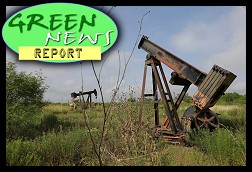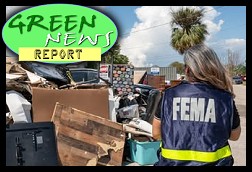 We unpack alotta long cons on today's BradCast, some of them decades in the making. Among them: Trump's new position on U.S. war in places like Syria, versus his position before he became President; GOP House Speaker Paul Ryan's position on deficit spending before he and Congressional Republicans exploded the deficit and he announced on Wednesday he's retiring from the U.S. House; And, Royal Dutch Shell's position on the dangers of global warming before a new, recently revealed treasure trove of internal company documents going back to the 50's revealed their real position on the matter. [Audio link to show follows below.]
We unpack alotta long cons on today's BradCast, some of them decades in the making. Among them: Trump's new position on U.S. war in places like Syria, versus his position before he became President; GOP House Speaker Paul Ryan's position on deficit spending before he and Congressional Republicans exploded the deficit and he announced on Wednesday he's retiring from the U.S. House; And, Royal Dutch Shell's position on the dangers of global warming before a new, recently revealed treasure trove of internal company documents going back to the 50's revealed their real position on the matter. [Audio link to show follows below.]
First up today, Donald Trump prepares to go to war in Syria and, despite mercilessly criticizing previous Presidents for revealing their intentions before taking military action, does exactly the same today on Twitter, in order to give a warning to Syria's top ally, Russia. That, despite unanswered questions about who was actually behind a recent reported chemical attack in a rebel-held town in the war-torn nation, the U.S. Congress' failure to authorize any such military action, as per the Constitution, and the threat that both Russia and Iran say they will target a response to efforts by the U.S. and its allies in the region like Israel.
Next, U.S. House Speaker Paul Ryan decides to call it quits, rather than risk losing his re-election bid this November in a predicted "blue wave", just after a new report from the non-partisan Congressional Budget Office (CBO) projects trillion dollar budget deficits as far as the eye can see, thanks to the GOP/Trump tax cuts and their recent spending bill. So much for the long-time, so-called "budget hawk" that Ryan (and Trump) pretended to be, while spending years attempting to gut Medicare, Medicaid and Social Security for Americans.
Then, we're joined by CARROLL MUFFETT, President and CEO of the Center for International Environmental Law to discuss a remarkable trove of recently unearthed internal documents from Royal Dutch Shell, revealing that the oil giant, just like Exxon and Mobil Oil before them, have known for decades about the threat of global warming caused by the burning of fossil fuels.
Muffett describes the newly unearthed documents, as detailed in their jaw-dropping new report, "A Crack in the Shell" [PDF], which shows that, as long ago as 1958(!), Shell was well aware of the dangerous consequences of carbon dioxide in the atmosphere caused by the burning of oil. And, as early as 1962, as the documents reveal, even urged internally "a "serious consideration of the maximum utilization of solar energy".
"The earliest document that we have with respect to Shell," he tells me, "was a report for the oil industry's Smoke and Fumes Committee that was reporting on research that the industry was funding into a variety of air pollutants. And even in 1958, one of those air pollutants was the pollution of the atmosphere by carbon from fossil sources."
"By 1962, we can demonstrate that Shell's chief geologist was very explicitly acknowledging the links between Shell's products and carbon dioxide from fossil fuels, and the potential for global warming," says Muffett. "So much so, that this scientist even highlighted the recommendations of other scientists that the switch to solar energy should begin as soon as possible."
Despite their scientific knowledge, as Muffett details today, the company eventually joined others in downplaying the threat of man-made climate change and now, according to the longtime attorney and leader in the newly emerging field of legal responses to global climate change, may face increased exposure for their part in our ever-worsening climate crisis.
"We see a remarkable transformation that goes on between 1988 and 1991, where the company is acknowledging these risks, and then by the mid-90s, Shell is, as with other oil companies, actively promoting uncertainty, and the need for inaction instead of action, in the face of mounting evidence," he explains, adding: "What we can now show, and this is very legally relevant, is that for decades, Shell was aware of those risks, and it continued to take those risks on the assumption that, ultimately, it would be consumers and governments that bore the cost, rather than Shell itself."
Please tune in for this remarkable discussion. It matters...
Finally today, a renewed bi-partisan effort emerges in the U.S. Senate to protect Special Counsel Robert Mueller from being fired by the President. But, with GOP leaders like Mitch McConnell in the Senate and Ryan still in the House, the legislation may not get very far, even as Trump continues to fume --- and lie --- about the ongoing probe.
(Snail mail support to "Brad Friedman, 7095 Hollywood Blvd., #594 Los Angeles, CA 90028" always welcome too!)
|


 'Mob Boss' Trump's Global Trade Sanctions Tank U.S., World Markets: 'BradCast' 4/3/25
'Mob Boss' Trump's Global Trade Sanctions Tank U.S., World Markets: 'BradCast' 4/3/25 'Green News Report' 4/1/25
'Green News Report' 4/1/25
 Dems Step Up: Crawford Landslide in WI; Booker Makes History in U.S. Senate: 'BradCast' 4/2/25
Dems Step Up: Crawford Landslide in WI; Booker Makes History in U.S. Senate: 'BradCast' 4/2/25 Judge Dismisses Long-Running Challenge to GA's Unverifiable, Insecure E-Vote System: 'BradCast' 4/1/25
Judge Dismisses Long-Running Challenge to GA's Unverifiable, Insecure E-Vote System: 'BradCast' 4/1/25 'Green News Report' 4/1/25
'Green News Report' 4/1/25 Bad Court and Election News for Trump is Good News for America: 'BradCast' 3/31/25
Bad Court and Election News for Trump is Good News for America: 'BradCast' 3/31/25 Sunday 'Great Start!' Toons
Sunday 'Great Start!' Toons Vets Push Back at Trump, Musk Plan to Slash Health Care, 80K V.A. Jobs: 'BradCast' 3/27/25
Vets Push Back at Trump, Musk Plan to Slash Health Care, 80K V.A. Jobs: 'BradCast' 3/27/25 'Green News Report' 3/27/25
'Green News Report' 3/27/25 Signal Scandal Worsens for Trump, GOP; Big Dem Election Wins in PA: 'BradCast' 3/26
Signal Scandal Worsens for Trump, GOP; Big Dem Election Wins in PA: 'BradCast' 3/26 'Emptywheel' on Why Trump NatSec Team Should 'Resign in Disgrace' After Signal Chat Debacle: 'BradCast' 3/25/25
'Emptywheel' on Why Trump NatSec Team Should 'Resign in Disgrace' After Signal Chat Debacle: 'BradCast' 3/25/25 'Green News Report' 3/25/25
'Green News Report' 3/25/25 USPS 'Belongs to the People, Not the Billionaires': 'BradCast' 3/24/25
USPS 'Belongs to the People, Not the Billionaires': 'BradCast' 3/24/25 Sunday 'Suddenly Conceivable' Toons
Sunday 'Suddenly Conceivable' Toons 'Green News Report' 3/20/25
'Green News Report' 3/20/25 We're ALL Voice of America Now: 'BradCast' 3/20/25
We're ALL Voice of America Now: 'BradCast' 3/20/25 What Trump's 'Timber Production Expansion' Means (and Costs): 'BradCast' 3/19/25
What Trump's 'Timber Production Expansion' Means (and Costs): 'BradCast' 3/19/25 Courts Largely Holding Against Trump, Musk Lawlessness: 'BradCast' 3/18/25
Courts Largely Holding Against Trump, Musk Lawlessness: 'BradCast' 3/18/25 Chief VOA Reporter on Outlet Falling Silent First Time Since 1942: 'BradCast' 3/17/25
Chief VOA Reporter on Outlet Falling Silent First Time Since 1942: 'BradCast' 3/17/25 Trump EPA Unveils Plans to Endanger, Sicken Americans: 'BradCast' 3/13/25
Trump EPA Unveils Plans to Endanger, Sicken Americans: 'BradCast' 3/13/25 Trump Nixed Enforce-ment Against 100 Corp. Lawbreakers: 'BradCast' 3/12/25
Trump Nixed Enforce-ment Against 100 Corp. Lawbreakers: 'BradCast' 3/12/25 Bad Day for 'Strongmen': 'BradCast' 3/11
Bad Day for 'Strongmen': 'BradCast' 3/11 WI Election Could Flip Supreme Court Control, Musk Jumps In: 'BradCast' 3/10
WI Election Could Flip Supreme Court Control, Musk Jumps In: 'BradCast' 3/10
 VA GOP VOTER REG FRAUDSTER OFF HOOK
VA GOP VOTER REG FRAUDSTER OFF HOOK Criminal GOP Voter Registration Fraud Probe Expanding in VA
Criminal GOP Voter Registration Fraud Probe Expanding in VA DOJ PROBE SOUGHT AFTER VA ARREST
DOJ PROBE SOUGHT AFTER VA ARREST Arrest in VA: GOP Voter Reg Scandal Widens
Arrest in VA: GOP Voter Reg Scandal Widens ALL TOGETHER: ROVE, SPROUL, KOCHS, RNC
ALL TOGETHER: ROVE, SPROUL, KOCHS, RNC LATimes: RNC's 'Fired' Sproul Working for Repubs in 'as Many as 30 States'
LATimes: RNC's 'Fired' Sproul Working for Repubs in 'as Many as 30 States' 'Fired' Sproul Group 'Cloned', Still Working for Republicans in At Least 10 States
'Fired' Sproul Group 'Cloned', Still Working for Republicans in At Least 10 States FINALLY: FOX ON GOP REG FRAUD SCANDAL
FINALLY: FOX ON GOP REG FRAUD SCANDAL COLORADO FOLLOWS FLORIDA WITH GOP CRIMINAL INVESTIGATION
COLORADO FOLLOWS FLORIDA WITH GOP CRIMINAL INVESTIGATION CRIMINAL PROBE LAUNCHED INTO GOP VOTER REGISTRATION FRAUD SCANDAL IN FL
CRIMINAL PROBE LAUNCHED INTO GOP VOTER REGISTRATION FRAUD SCANDAL IN FL Brad Breaks PA Photo ID & GOP Registration Fraud Scandal News on Hartmann TV
Brad Breaks PA Photo ID & GOP Registration Fraud Scandal News on Hartmann TV  CAUGHT ON TAPE: COORDINATED NATIONWIDE GOP VOTER REG SCAM
CAUGHT ON TAPE: COORDINATED NATIONWIDE GOP VOTER REG SCAM CRIMINAL ELECTION FRAUD COMPLAINT FILED AGAINST GOP 'FRAUD' FIRM
CRIMINAL ELECTION FRAUD COMPLAINT FILED AGAINST GOP 'FRAUD' FIRM RICK SCOTT GETS ROLLED IN GOP REGISTRATION FRAUD SCANDAL
RICK SCOTT GETS ROLLED IN GOP REGISTRATION FRAUD SCANDAL VIDEO: Brad Breaks GOP Reg Fraud Scandal on Hartmann TV
VIDEO: Brad Breaks GOP Reg Fraud Scandal on Hartmann TV RNC FIRES NATIONAL VOTER REGISTRATION FIRM FOR FRAUD
RNC FIRES NATIONAL VOTER REGISTRATION FIRM FOR FRAUD EXCLUSIVE: Intvw w/ FL Official Who First Discovered GOP Reg Fraud
EXCLUSIVE: Intvw w/ FL Official Who First Discovered GOP Reg Fraud GOP REGISTRATION FRAUD FOUND IN FL
GOP REGISTRATION FRAUD FOUND IN FL


































